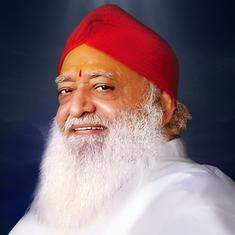On Saturday, the police in Hyderabad arrested two moviegoers for not standing up for the national anthem. A first information report was registered against them on the complaint of a journalist, who said he had taken the step out of “personal interest” and as a citizen of India.
The arrests come in the wake of a Supreme Court order in November that made it mandatory for movie theatres to play the national anthem before every film screening and for the audience to stand for its duration. This ruling led to several people, including the disabled, being arrested, assaulted and abused for remaining seated during the anthem. The court later amended its order to exempt those with disabilities.
Syed Safeer Hussaini was at the Inox theatre in Hyderabad’s Kachiguda suburb with his friend Mohammed Ilyas to watch the Telugu horror thriller Chitrangada on Saturday. The 30-year-old works in Australia and had come home for his wedding two weeks ago. He was to head back to Australia shortly.
But the movie outing soon turned into an unpleasant experience. “I had sprained my leg climbing the stairs,” Hussaini told Scroll.in. “Though I was about to stand during the national anthem, I heard someone behind me shouting, ‘arrey… arrey’. When I heard him shout, I was really annoyed and didn’t stand.”
Soon after, the police came and took the two men to the police station. “They didn’t even tell us what sections they booked the FIR under,” said Hussaini. “They were reluctant to show us the FIR copy and didn’t allow us to call our family members either. They switched off our phones and made us sit from 7.30 pm till 11.30 pm.”
The case, it turned out, had been registered under Section 3 of the Prevention of Insults to National Honour Act, 1971 – which deals with intentionally preventing the singing of the national anthem or disturbing anyone engaged in singing it, and carries a sentence of up to three years in jail and/or a fine.
A furious Hussaini said the police called his brother and “threatened him, saying I had committed a very big crime, as if I murdered someone”. The two men were released later that night on bail.
Hussaini’s family said what was a minor issue had been blown out of proportion. “I don’t know why people are making it a big issue,” said Hussaini’s brother, who did not want to be identified. “I am a lawyer and I know the rules and they didn’t even tell us under which section they filed the case, and they were very rude to us.”
He also pointed out that his brother was unaware of the Supreme Court’s order. “He has come to India from Australia after nine years and it’s just been 25 days since he arrived,” he said. “How could you expect him to know Indian rules? We all know that it is not mandatory to stand up for the national anthem, then under which section have they booked this case?”
The family said they were now worried that the police case would get in the way of Hussaini returning to Australia and rejoining work. “I just want to know this – if it is punishable to not stand up during the national anthem, then shouting during the national anthem should also be a crime, right?” asked Hussaini. “I too can file a case against him [the complainant].”
‘I felt bad, so I complained’
The complainant, A Sampath, a journalist with a Telugu news channel, said a past experience had guided his actions on Saturday. “Earlier, I was watching another movie, Dwaraka, when I saw a couple, one of whom did not stand for the national anthem,” he said. “I felt bad then. And when I came for this movie and I saw the same situation being repeated, I felt really annoyed. I asked them to stand but they denied my words. One person [Ilyas] stood on my insistence but the other person [Hussaini] forced him to sit down and was chatting on his mobile.”
The journalist decided to file a police complaint against the two. “The police asked me whether they are Hindus or Muslims,” Sampath said. “How do I know, I said. I couldn’t see them clearly in the theatre lighting.”
Meanwhile, news of the incident reached Malakpet MLA Ahmed Bin Abdullah Balala of the Majlis-e-Ittehadul Muslimeen. He contacted the police station and asked the police to take it easy. “When I came to know that he [Hussaini] is an Australian citizen, I called the police station to pass on this information,” Balala said. “It is not good on our part to treat a person who doesn’t know Indian rules like this. When I said this, the police said we will do our enquiry.”
As the debate over the Supreme Court’s order continues, films that have the national anthem playing as part of their script have caused some confusion. This prompted the Supreme Court in February to clarify that there is no need to stand up compulsorily in such cases.
The complainant in the Hyderabad case said there should be no confusion over the court’s latest ruling. “Many people take this the wrong way,” he said. “When Gazi movie was released, there was national anthem in between the movie – so a few people complained about others not standing up for that. Then the Supreme Court said there is no need to stand if national anthem is played in between the movie. It doesn’t mean that there is no need to stand before the screening of a movie.”
He also said there was a need for strict implementation of the rule, adding, “I have even complained through Prime Minister Narendra Modi’s App to make the law even more stringent.”
The journalist said his actions had nothing to do with his workplace. “It’s out of my personal interest I gave the complaint as a citizen,” he added.










